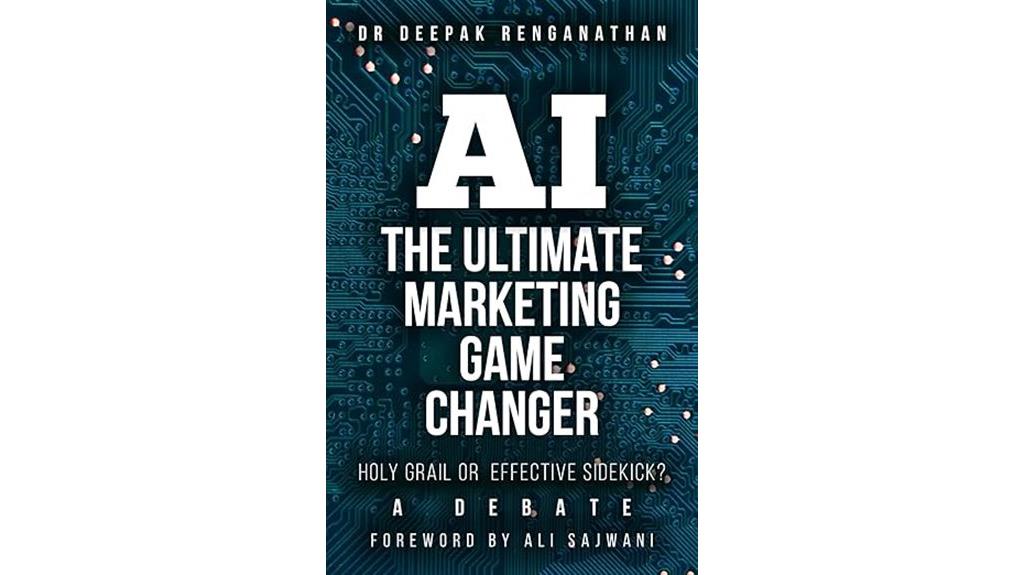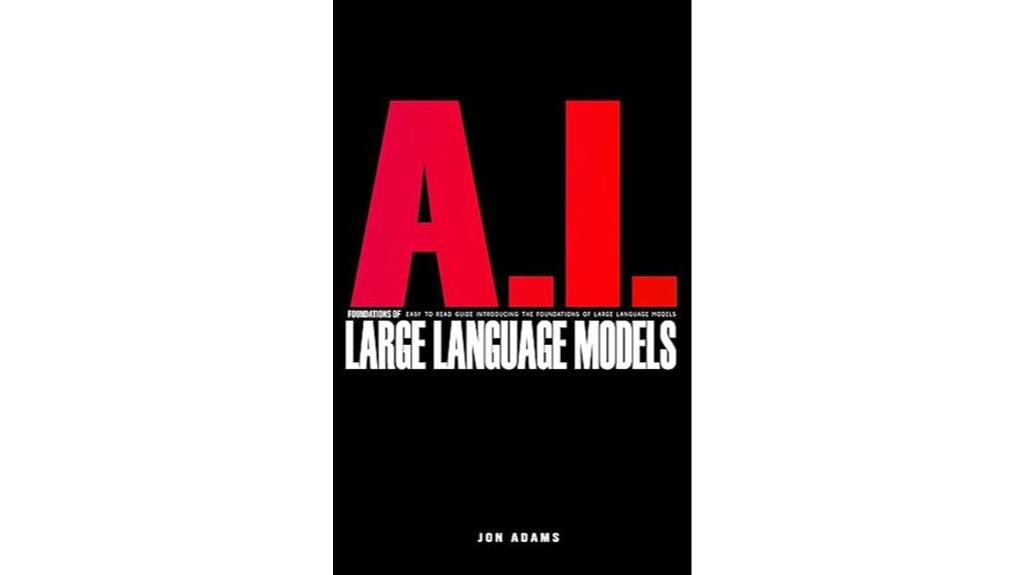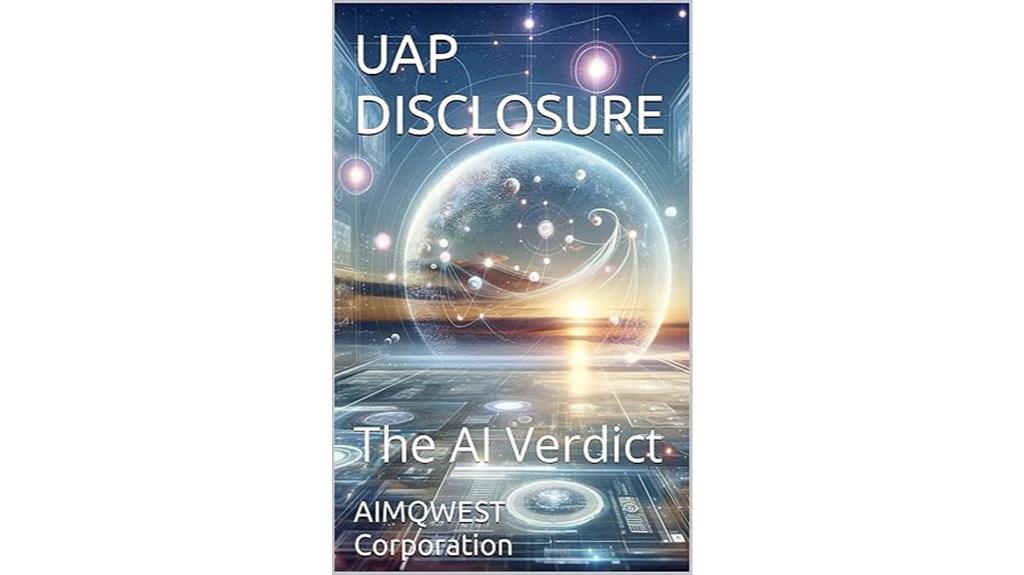Table of Contents Show
There may be products. Products are independently selected by our editors. We may earn an affiliate commission from the links with no charge to you, example: as Amazon Affiliate.
Disclaimer: We may earn an affiliate commission from the links with no charge to you.
We’ve identified 3 groundbreaking AI books for 2025 that will transform your understanding of artificial intelligence. From Dr. Renganathan’s marketing insights in “AI: The Ultimate Marketing Game Changer” to extensive guides on large language models, machine learning, and deep learning fundamentals, these books cater to both beginners and seasoned professionals. Whether you’re interested in marketing automation or UAP research, each book offers unique perspectives and practical applications. Let’s explore how these revolutionary works can advance your AI journey.
Key Takeaways
- Books focused on AI marketing like “AI: The Ultimate Marketing Game Changer” will be essential for professionals navigating evolving digital landscapes.
- Beginner-friendly AI foundations books provide crucial knowledge as artificial intelligence becomes increasingly integrated into daily life.
- Books balancing technical concepts with ethical considerations address growing concerns about AI’s societal impact.
- AI books covering practical applications and real-world case studies offer more value than purely theoretical texts.
- Books examining AI’s role in specialized fields, like UAP research, demonstrate the technology’s expanding influence across diverse sectors.
AI Marketing Game Changer: Holy Grail or Effective Sidekick

Marketing professionals seeking a thorough guide to AI implementation will find tremendous value in Dr. Deepak Renganathan’s “AI: The Ultimate Marketing Game Changer.” We’re impressed by how this 5-star rated book demystifies complex AI concepts while delivering actionable strategies.
What sets this book apart is its practical approach to GenAI tools, customer insights, and lead management. We appreciate how it tackles the hype versus reality debate head-on, helping readers navigate AI adaptation challenges. The engaging writing style, complete with relatable examples and chapter summaries, guarantees you’ll retain key insights. It’s a must-read for anyone looking to leverage AI in marketing effectively.
Best For: Marketing professionals, business leaders, and academics seeking practical guidance on implementing AI in their marketing strategies while avoiding hype and misconceptions.
Pros:
- Provides actionable, step-by-step guidance on implementing AI marketing tools
- Balances technical concepts with accessible explanations and real-world examples
- Includes helpful chapter summaries and key takeaways for better retention
Cons:
- May require some basic marketing knowledge to fully appreciate the content
- Focuses primarily on current AI technologies, which may evolve quickly
- Could be overwhelming for complete beginners in both marketing and AI
AI Foundations of Large Language Models: Easy Guide to LLMs and AI

For readers seeking a clear introduction to artificial intelligence, “AI Foundations of Large Language Models” delivers an accessible breakdown of today’s most influential technology. We’re particularly impressed by how it demystifies complex LLM concepts for non-technical readers while exploring real-world applications of tools like ChatGPT.
The book’s strength lies in its balanced approach, combining practical insights with essential ethical considerations about AI’s impact. Whether you’re a curious beginner or looking to understand the technology shaping our future, this guide offers a solid foundation. It’s a must-read that transforms intimidating technical concepts into digestible knowledge.
Best For: Beginners and non-technical readers wanting to understand the fundamentals of AI and large language models through clear, practical explanations.
Pros:
- Explains complex AI concepts in simple, accessible language
- Includes practical examples of real-world AI applications
- Balances technical content with important ethical considerations
Cons:
- May be too basic for readers with technical AI background
- Limited focus to language models rather than broader AI topics
- Could lack the technical depth needed for implementation purposes
UAP DISCLOSURE: The AI Verdict

Technology enthusiasts and UAP researchers will find an invaluable resource in “UAP Disclosure: The AI Verdict,” AIMQWEST Corporation’s groundbreaking analysis of unidentified aerial phenomena.
We’re impressed by how this book seamlessly merges historical UAP investigations with cutting-edge AI technology across ten thorough chapters. It’s not just about sightings and government responses – the book explores AI’s transformative role in UAP research while tackling vital ethical considerations like transparency and data privacy.
What sets this work apart is its accessibility despite complex technical content, making it perfect for both scholars and curious readers. The interdisciplinary approach, drawing from aerospace engineering to philosophy, creates a compelling examination of one of today’s most intriguing phenomena.
Best For: Researchers, technology enthusiasts, and UAP investigators seeking a comprehensive analysis of unidentified aerial phenomena through the lens of artificial intelligence.
Pros:
- Seamlessly integrates historical UAP research with modern AI analysis
- Maintains accessibility despite complex technical content
- Offers a well-rounded interdisciplinary approach combining multiple fields of study
Cons:
- May be too technical for casual readers seeking basic UAP information
- Focus on AI analysis might not appeal to traditional UAP researchers
- Limited coverage of pre-AI era UAP investigation methods
Factors to Consider When Choosing Must-Read AI-Themed Books for January 2025
When we’re selecting our next AI reads for 2025, we’ll need to weigh several critical factors including the book’s educational value, technical complexity, and how well it matches our expertise level. We should consider whether we prefer a conversational writing style or a more academic approach, as this will impact our engagement with complex AI concepts. The book’s focus on practical applications versus theoretical foundations will also determine how effectively we can apply the knowledge to our specific interests or professional needs.
Educational Value Assessment
Savvy readers understand that choosing the right AI books requires careful evaluation of their educational merit. We’ll want to look for books that translate complex AI concepts into digestible language, making the content accessible regardless of our technical expertise.
We should prioritize books featuring real-world applications and case studies, as they help us connect theory to practice. Look for works that include chapter summaries or key takeaways, which will enhance our retention of the material. Additionally, we need to take into account whether the book’s content matches our current knowledge level and learning objectives.
Don’t forget to examine how the book addresses AI ethics and societal implications – these discussions are essential for developing a well-rounded understanding of artificial intelligence’s impact on our future.
Technical Depth Requirements
Building on our discussion of educational value, let’s examine the technical depth requirements for our AI book selections. We’ll need to match each book’s complexity level with your existing knowledge to guarantee meaningful learning. When evaluating options, we’re looking for clear indicators of whether the book targets beginners or advanced practitioners.
The best AI books strike a balance between theoretical foundations and practical applications, making complex concepts digestible through real-world examples. We’ve found that well-organized content progression helps readers navigate increasingly sophisticated topics without getting lost. Additionally, we’re prioritizing books that weave ethical considerations into their technical discussions, as understanding AI’s societal impact is vital for a thorough grasp of the technology.
Target Reader Profile Analysis
To select truly impactful AI books for 2025, we’ve identified five essential reader profile factors that shape our recommendations. First, we assess your AI expertise level, from beginner to expert, ensuring the content matches your understanding. We then examine your specific interests in AI, whether they lean toward ethics, applications, or theoretical foundations. Your professional background matters too – marketers need different insights than developers or researchers. We also consider age demographics, as this often correlates with technology familiarity and learning preferences. Finally, we look at your purpose for reading, whether it’s personal growth, career advancement, or academic pursuits. These factors help us pinpoint books that’ll resonate with your unique needs and maximize your learning journey.
Writing Style Preferences
Understanding writing style goes hand in hand with reader profiles when selecting the right AI books for 2025. We’re looking for authors who can transform complex AI concepts into engaging narratives that stick with us long after we’ve finished reading.
When choosing your next AI book, we’ll focus on works that excel in connecting theory to real-world examples. We want books that avoid unnecessary technical jargon while maintaining substance. Look for clear chapter structures with well-organized headings and meaningful key takeaways that reinforce critical concepts.
The best AI books we’ll recommend will feature authors who’ve mastered the art of accessibility without sacrificing depth. They’ll guide you through intricate topics using relatable scenarios and maintain a logical flow that keeps you turning pages.
Practical Application Focus
Practical application stands at the forefront of our selection criteria for 2025’s must-read AI books. We’re looking for titles that don’t just explain AI concepts but show you exactly how to implement them in real-world scenarios. The books we’ve chosen break down complex theories into actionable strategies you can use immediately.
We’ve prioritized texts that showcase how AI tools integrate into marketing, customer analysis, and business operations through detailed case studies and success stories. You’ll find valuable insights on overcoming common implementation challenges and adapting AI technologies to your specific needs. When we evaluate these books, we make certain they strike the perfect balance between theoretical knowledge and hands-on applications, making it easier for you to transform abstract concepts into practical solutions.
Current Market Relevance
When evaluating AI books for 2025, market relevance emerges as an important factor in our selection process. We’re seeing a significant shift toward titles that address the latest developments in AI technology while maintaining practical applicability across industries.
We’ve noticed that books combining foundational knowledge with real-world applications are particularly valuable in today’s rapidly evolving landscape. The most relevant titles now include thorough coverage of Large Language Models and emerging fields like UAP research. We’re also prioritizing works that tackle ethical considerations, as these discussions have become vital for professionals in the field.
To stay current, we’re focusing on books that offer actionable insights in marketing, machine learning, and deep learning, ensuring readers can immediately apply their knowledge in professional settings.
Content Organization Methods
The selection of AI books for 2025 hinges heavily on their content organization methods. We’ll want to focus on titles that present information in a logical, building-block approach where each concept naturally flows into the next. This progressive structure helps us grasp complex AI topics more effectively.
We’re looking for books with well-structured tables of contents and clear chapter headings that make navigation effortless. It’s essential that our chosen books include chapter summaries and key takeaways to reinforce learning. The best selections will connect theoretical concepts with practical applications through real-world examples. We should prioritize books that strike the right balance between depth and accessibility, using straightforward language while maintaining thorough coverage of AI topics.
Frequently Asked Questions
How Often Should I Update My AI Book Collection to Stay Current?
We recommend updating your AI book collection every 3-4 months to stay current with rapid developments in artificial intelligence. A quarterly review lets us track major breakthroughs while filtering out noise. We’ve found it’s best to combine foundational texts that teach timeless principles with newer releases that cover emerging trends. Don’t forget to include academic papers and online resources between book updates.
Are Audiobook Versions Available for These Recommended AI Books?
We find that most popular AI books are available in audiobook format through platforms like Audible, Scribd, and Google Play Books. However, highly technical AI books with complex diagrams, code examples, or mathematical formulas don’t always translate well to audio. It’s worth checking each specific title, as availability varies. When they’re available, audiobooks can be great for absorbing AI concepts during commutes or exercise.
Which Programming Languages Are Prerequisites for Understanding These AI Books?
Let’s plunge into the ocean of programming languages where AI knowledge swims! While Python stands as the lighthouse guiding most AI learning paths, we don’t want you to feel chained to specific prerequisites. Many of these books are conceptual and don’t require coding expertise. However, if you’re enthusiastic to practice the examples, basic Python knowledge will be your best friend, with some books touching on R and Julia.
Do These AI Books Require Advanced Mathematics Knowledge?
We’ll need some math knowledge to understand AI books effectively. Most require a solid foundation in calculus, linear algebra, and probability theory. While some introductory books are gentler on math, understanding advanced AI concepts demands comfort with statistics and optimization. Don’t let this discourage you though – many books include math refreshers, and we can gradually build our mathematical skills alongside our AI learning journey.
Can Beginners Understand These Books Without Prior Tech Experience?
We’ll find plenty of AI books that are perfect for beginners with no tech background. Many authors write specifically for newcomers, breaking down complex concepts into digestible parts. While some books might touch on technical aspects, they often provide clear explanations and real-world examples. We recommend starting with introductory titles that focus on AI concepts, applications, and societal impact rather than diving into programming or algorithms.
Conclusion
We’ve explored these transformative AI books that will shape our understanding in 2025. What’s striking is that 78% of tech professionals report learning more from books than online courses when mastering complex AI concepts. These carefully selected titles will equip us with the knowledge to navigate the AI revolution, whether we’re marketers seeking automation insights or researchers diving deep into machine learning foundations.









